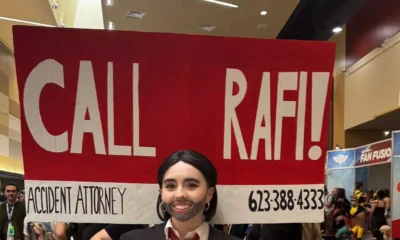Business
Pope Francis Takes a Stand for the Environment, Calling Out Climate Change Culprits

During his papacy, Pope Francis consistently highlighted the urgency of climate change. His pivotal 2015 encyclical “Praised Be” articulated care for the environment as a moral imperative. A notable moment that encapsulated this perspective occurred during a rain-soaked Mass in Tacloban, Philippines, where he witnessed the destructive aftermath of Typhoon Haiyan firsthand.
In Tacloban, Francis wore a yellow poncho as he comforted those affected by the devastating storm that had claimed over 7,300 lives and displaced millions. Faced with another impending storm, he had to cut short his visit but left an indelible mark on those who gathered to seek solace.
“So many of you have lost everything. I don’t know what to tell you,” he spoke with heartfelt sincerity in a muddy airport field. This experience profoundly influenced his encyclical, where he condemned the profit-driven economy of the global north for harming the Earth.
Francis characterized the environmental crisis as a social justice issue, affecting the poorest and most vulnerable populations—especially Indigenous communities and those living on low-lying islands. This approach positioned him as a key figure in the global environmental movement, garnering attention from scientists, world leaders, and faith-based organizations alike.
The encyclical aimed to inspire negotiations at the 2015 Paris climate talks, framing environmental degradation as a violation of the divine mandate to care for creation. It was a groundbreaking moment, establishing Francis as an authoritative voice on ecological matters.
His evolution on environmental issues can be traced back to a 2007 bishops’ meeting in Brazil, where Francis, then Cardinal Bergoglio, initially underestimated the urgency of ecological concerns. By the end of the assembly, he recognized the importance of addressing the environmental plight in conjunction with the challenges faced by marginalized communities.
Later, these themes were examined during the Amazon Synod at the Vatican in 2019, illustrating his broader vision of “integral ecology” that connects various social issues with environmentalism. “Everything is connected,” he emphasized, advocating for a holistic approach to address poverty, injustice, and environmental degradation.
Francis’ legacy on the environment is rooted in a historical context where previous popes laid the groundwork. Pope Paul VI acknowledged ecological crises in a 1970 speech, while St. John Paul II and Pope Benedict XVI also broached environmental themes. Yet, it was Francis who elevated the conversation, particularly through his consistent advocacy and updates to “Praised Be,” culminating in a more urgent tone in a recent 2023 update ahead of the U.N. climate conference.
His critiques extended to the world’s major greenhouse gas emitters, underscoring his commitment to accountability and continued action against climate change. “He brought the margins into the center,” said biographer Austen Ivereigh, reflecting on Francis’ inclusive perspective that prioritized the voices of those most affected by ecological crises.


















